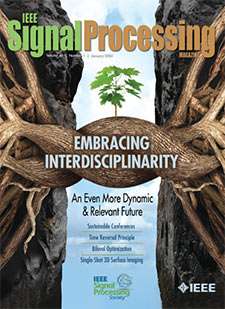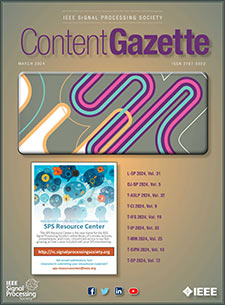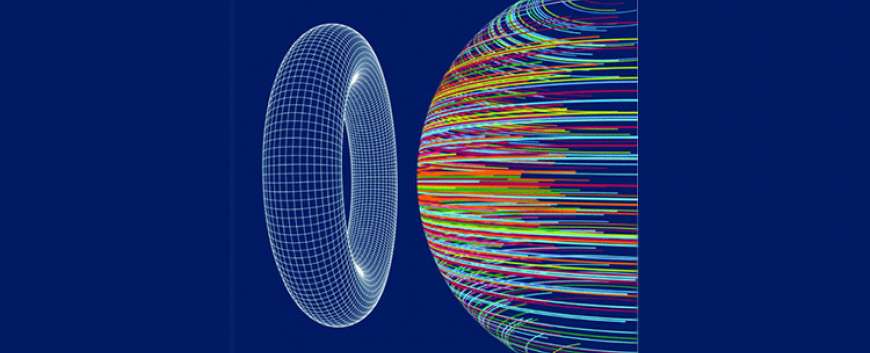- Our Story
- Publications & Resources
- Publications & Resources
- Publications
- IEEE Signal Processing Magazine
- IEEE Journal of Selected Topics in Signal Processing
- IEEE Signal Processing Letters
- IEEE/ACM Transactions on Audio Speech and Language Processing
- IEEE Transactions on Computational Imaging
- IEEE Transactions on Image Processing
- IEEE Transactions on Information Forensics and Security
- IEEE Transactions on Multimedia
- IEEE Transactions on Signal and Information Processing over Networks
- IEEE Transactions on Signal Processing
- IEEE TCI
- IEEE TSIPN
- Data & Challenges
- Submit Manuscript
- Guidelines
- Information for Authors
- Special Issue Deadlines
- Overview Articles
- Top Accessed Articles
- SPS Newsletter
- SigPort
- SPS Resource Center
- Publications Feedback
- Publications FAQ
- Blog
- News
- Dataset Papers
- Conferences & Events
- Community & Involvement
- Professional Development
- For Volunteers
- Information for Authors-OJSP
-
Home
Conferences Events IEEE JSTSP Article IEEE Signal Processing Magazine IEEE TIFS Article IEEE TMM Article IEEE TSP Article Jobs in Signal Processing Lectures Machine Learning Seasonal Schools Signal Processing News SPM Article SPS Distinguished Lectures SPS Newsletter Article SPS Webinar SPS Webinars SPS Webinar Series Webinar webinars
-
Our Story
What is Signal Processing?

The technology we use, and even rely on, in our everyday lives –computers, radios, video, cell phones – is enabled by signal processing. Learn More » -
Publications & Resources
-
SPS Resources
- Signal Processing Magazine The premier publication of the society.
- SPS Newsletter Monthly updates in Signal Processing
- SPS Resource Center Online library of tutorials, lectures, and presentations.
- SigPort Online repository for reports, papers, and more.
- SPS Feed The latest news, events, and more from the world of Signal Processing.
-
SPS Resources
-
Conferences & Events
-
Community & Involvement
-
Membership
- Join SPS The IEEE Signal Processing Magazine, Conference, Discounts, Awards, Collaborations, and more!
- Chapter Locator Find your local chapter and connect with fellow industry professionals, academics and students
- Women in Signal Processing Networking and engagement opportunities for women across signal processing disciplines
- Students Scholarships, conference discounts, travel grants, SP Cup, VIP Cup, 5-MICC
- Young Professionals Career development opportunities, networking
- Get Involved
-
Technical Committees
- Applied Signal Processing Systems
- Audio and Acoustic Signal Processing
- Bio Imaging and Signal Processing
- Computational Imaging
- Image Video and Multidimensional Signal Processing
- Information Forensics and Security
- Machine Learning for Signal Processing
- Multimedia Signal Processing
- Sensor Array and Multichannel
- Signal Processing for Communication and Networking
- Signal Processing Theory and Methods
- Speech and Language Processing
- Technical Working Groups
- More TC Resources
-
Membership
-
Professional Development
-
Professional Development
- Mentoring Experiences for Underrepresented Young Researchers (ME-UYR)
- Micro Mentoring Experience Program (MiME)
- Distinguished Lecturer Program
- Distinguished Lecturers
- Distinguished Lecturer Nominations
- Past Lecturers
- Distinguished Industry Speaker Program
- Distinguished Industry Speakers
- Distinguished Industry Speaker Nominations
- Industry Resources
- IEEE Training Materials
- Jobs in Signal Processing: IEEE Job Site
-
Career Resources
- SPS Education Program Educational content in signal processing and related fields.
- Distinguished Lecturer Program Chapters have access to educators and authors in the fields of Signal Processing
- PROGRESS Initiative Promoting diversity in the field of signal processing.
- Job Opportunities Signal Processing and Technical Committee specific job opportunities
- Job Submission Form Employers may submit opportunities in the area of Signal Processing.
-
Professional Development
-
For Volunteers
-
For Board & Committee Members
- Board Agenda/Minutes* Agendas, minutes and supporting documentation for Board and Committee Members
- SPS Directory* Directory of volunteers, society and division directory for Board and Committee Members.
- Membership Development Reports* Insight into the Society’s month-over-month and year-over-year growths and declines for Board and Committee Members
-
For Board & Committee Members
Popular Pages
Today's:
- (MLSP 2024) 2024 IEEE International Workshop on Machine Learning for Signal Processing
- Submit a Manuscript
- Information for Authors
- Awards & Submit Award Nomination
- (ACSSC 2024) 2024 Asilomar Conference on Signals, Systems, and Computers
- (SLT 2024) 2024 IEEE Spoken Language Technology Workshop
- IEEE/ACM Transactions on Audio Speech and Language Processing
- IEEE Transactions on Information Forensics and Security
- IEEE Signal Processing Letters
- SPS Scholarship Program
- Governance Documents
- IEEE Transactions on Image Processing
- Video & Image Processing Cup
- IEEE Signal Processing Magazine
- (ICASSP 2025) 2025 IEEE International Conference on Acoustics, Speech and Signal Processing
All time:
- Information for Authors
- Submit a Manuscript
- IEEE Transactions on Image Processing
- 404 Page
- IEEE/ACM Transactions on Audio Speech and Language Processing
- IEEE Transactions on Information Forensics and Security
- IEEE Transactions on Multimedia
- IEEE Signal Processing Letters
- IEEE Transactions on Signal Processing
- Conferences & Events
- IEEE Journal of Selected Topics in Signal Processing
- Information for Authors-SPL
- Conference Call for Papers
- Signal Processing 101
- IEEE Signal Processing Magazine
Last viewed:
- (ACSSC 2024) 2024 Asilomar Conference on Signals, Systems, and Computers
- (AVSS 2024) 2024 IEEE International Conference on Advanced Video and Signal-Based Surveillance
- Guidelines
- (ICASSP 2025) 2025 IEEE International Conference on Acoustics, Speech and Signal Processing
- ICASSP 2021 Call for Reviewers
- SPS Scholarship Program
- (CISA 2024) 2024 IEEE Conference on Computational Imaging Using Synthetic Apertures
- (APSIPA ASC 2024) 2024 Asia Pacific Signal and Information Processing Association Annual Summit and Conference
- (ICME 2020) 2020 IEEE International Conference on Multimedia and Expo
- (MLSP 2024) 2024 IEEE International Workshop on Machine Learning for Signal Processing
- (CoSeRa 2024) 2024 International Workshop on the Theory of Computational Sensing and its Applications to Radar, Multimodal Sensing and Imaging
- Members
- IEEE JSTSP Special Issue on Distributed Signal Processing for Extremely Large-Scale Antenna Array Systems
- IEEE JSTSP Special Issue on Signal Processing Advances in Wireless Transmission of Information and Power
- (SLT 2024) 2024 IEEE Spoken Language Technology Workshop
Demystifying Lie Group Methods for Signal Processing: A Tutorial
You are here
Publications & Resources
- Publications & Resources
- Publications
- Submit a Manuscript
- Editorial Board Nominations
- Challenges & Data Collections
- Publication Guidelines
- Information for Authors
- Special Issue Deadlines
- Overview Articles
- Top Accessed Articles
- SPS Newsletter
- SigPort
- SPS Resource Center
- Publications Feedback
- Publications FAQ
- Blog
- News
Signal Processing Magazine
For Authors
Top Reasons to Join SPS Today!
1. IEEE Signal Processing Magazine
2. Signal Processing Digital Library*
3. Inside Signal Processing Newsletter
4. SPS Resource Center
5. Career advancement & recognition
6. Discounts on conferences and publications
7. Professional networking
8. Communities for students, young professionals, and women
9. Volunteer opportunities
10. Coming soon! PDH/CEU credits
Click here to learn more.
Demystifying Lie Group Methods for Signal Processing: A Tutorial
Many problems in signal processing [e.g., filter bank design, independent component analysis (ICA), beamforming design, and neural network training] can be formulated as optimization over groups of transformations that depend continuously on real parameters (Lie groups). Such problems are usually tackled in two ways: using a constrained optimization procedure or using some parameterization to transform them into unconstrained problems.
Many problems in signal processing [e.g. filter bank design, independent component analysis (ICA), beamforming design, and neural network training] can be formulated as optimization over groups of transformations that depend continuously on real parameters (Lie groups). Such problems are usually tackled in two ways: using a constrained optimization procedure or using some parameterization to transform them into unconstrained problems.
There is a third way, though. In the numerical analysis literature, it is possible to find several algorithms especially tailored for Lie groups. The description of such algorithms, however, uses mathematical concepts that are not widely known in the signal processing community and can be obscure for the practitioner. This article presents to the signal processing community these specialized techniques using only some basic analysis and linear algebra.
The objective of this article is to present some very powerful but little-known techniques for optimization over spaces that can be constructed as homogeneous spaces starting from continuous groups of transformations (Lie groups). Despite the apparently very abstract setting, this kind of problem is found in several signal processing contexts.
SPS on Twitter
- DEADLINE EXTENDED: The 2023 IEEE International Workshop on Machine Learning for Signal Processing is now accepting… https://t.co/NLH2u19a3y
- ONE MONTH OUT! We are celebrating the inaugural SPS Day on 2 June, honoring the date the Society was established in… https://t.co/V6Z3wKGK1O
- The new SPS Scholarship Program welcomes applications from students interested in pursuing signal processing educat… https://t.co/0aYPMDSWDj
- CALL FOR PAPERS: The IEEE Journal of Selected Topics in Signal Processing is now seeking submissions for a Special… https://t.co/NPCGrSjQbh
- Test your knowledge of signal processing history with our April trivia! Our 75th anniversary celebration continues:… https://t.co/4xal7voFER
Home | Sitemap | Contact | Accessibility | Nondiscrimination Policy | IEEE Ethics Reporting | IEEE Privacy Policy | Terms | Feedback
© Copyright 2024 IEEE – All rights reserved. Use of this website signifies your agreement to the IEEE Terms and Conditions.
A not-for-profit organization, IEEE is the world's largest technical professional organization dedicated to advancing technology for the benefit of humanity.










